All About Books discussion
Reads & Challenges Archive
>
Jean's Charles Dickens challenge 2014-2015 (and maybe a little further ...)
message 951:
by
Leslie
(new)
Nov 13, 2015 04:18PM
 How far along are you Jean?
How far along are you Jean?
reply
|
flag
 We've met Mr Micawber now :D But I may not read much of it today and tomorrow - want to do some more research - so think the end of chapter 12. I'll post more later.
We've met Mr Micawber now :D But I may not read much of it today and tomorrow - want to do some more research - so think the end of chapter 12. I'll post more later.I'm even enjoying the far shorter crisp chapter headings! :)
 Jean wrote: "We've met Mr Micawber now :D But I may not read much of it today and tomorrow - want to do some more research - so think the end of chapter 12. I'll post more later.
Jean wrote: "We've met Mr Micawber now :D But I may not read much of it today and tomorrow - want to do some more research - so think the end of chapter 12. I'll post more later.I'm even enjoying the far shor..."
I think I can catch up with you then - I will start today :)
 I love some of the characters' names - they're so appropriate!
I love some of the characters' names - they're so appropriate! Murdstone for instance, with his insistence that what everyone needs is "firmness". What does his name imply? Something dark - Murk? Murder? "Merde"? (French for excrement) followed by the hardness of "stone".
And the hard "metallic lady", his sister Jane, with her jewellery of "little steel fetters and rivets"; her bag with its heavy chain, snapping shut; the keys under her pillow. What a great description of her,
"a gloomy-looking lady she was; dark, like her brother, whom she greatly resembled in face and voice; and with very heavy eyebrows, nearly meeting over her large nose, as if, being disabled by the wrongs of her sex from wearing whiskers, she had carried them to that account."
The there's Creakle with his whispery threatening non-voice - how does he "creak"? Is it in his bones? Does he creep about and make everyone feel his painful "creaking" joints? Apparently he was originally called "Crinkle" in an early draft, but "Creakle" is so much better! It also sounds a bit like "treacle" as if with his soft voice he's pretending to be all sweet, but is actually very menacing.
 I have been finding out about some more of the characters' origins too.
I have been finding out about some more of the characters' origins too.Mr Creakle :
Just as in Nicholas Nickleby, "Dotheboys Hall" was based on an actual school, in this novel Charles Dickens bases "Salem House" on an appalling school he attended as a child, "Wellington House Classical and Commercial Academy", which was run by a sadistic man called William Jones.
William Jones was the original for ... "Mr Creakle" of course! Charles Dickens once said that Jones was,
"by far the most ignorant man I have ever had the pleasure to know, who was one of the worst tempered men perhaps that ever lived, whose business it was to make as much out of us and put as little into us as possible".
Tommy Traddles :
Tommy Traddles has just come into the story, and will prove to be very important. He was also based on a real person, Sir Thomas Noon Talfourd a barrister, judge, M.P. and playwright, who becmae a close friend of Charles Dickens when side by side they fought against all the plagiarism of their works. Copyright was in its very early stages then, and the issue of pirate copies of his works was one of Dickens's bugbears. "Tommy Traddles" and the judge had a lot in common with their "personal diligence, gentle disposition, and journalistic output".
Charles Dickens described his "fervent admiration" of Talfourd, and dedicated the first book edition of The Pickwick Papers to him, telling his friend and mentor John Forster that it was,
"a memorial of the most gratifying friendship I have ever contracted."
 There are so many great episodes in these first few chapters - they're really crammed with them! I love the episode of the waiter, (view spoiler) - and the accompanying illustration by "Phiz":
There are so many great episodes in these first few chapters - they're really crammed with them! I love the episode of the waiter, (view spoiler) - and the accompanying illustration by "Phiz":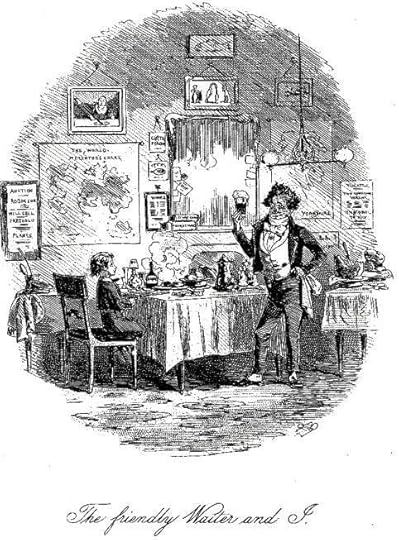
which makes David look such a tiny little tot :) Apparently the artist Hablot Knight Browne ("Phiz") included the map of the world to imply how much David had to learn and a faint image of the fox and stork from Aesop's Fables to put the idea of (view spoiler) in our minds.
Then wouldn't you know it, Steerforth, David's (view spoiler)
All this shows me how well Charles Dickens is getting into the mind of a child. This is the first novel he wrote from the first hand point of view. What I'm not sure of yet is whether the auhtor's voice is also that of the narrator. How old is the older David meant to be? And is he he remembering truthfully, or are his views coloured by subsequent experience? How well do any of us remember our childhoods objectively?
I'm assuming we have a reliable narrator here, (not an unreliable one!) since Charles Dickens says there is a lot of him in it. In the preface to the Charles Dickens Edition of 1867 he wrote,
"Of all my books, I like this the best. It will be easily believed that I am a fond parent to every child of my fancy, and that no one can ever love that family as dearly as I love them. But, like many fond parents, I have in my heart of hearts a favourite child. And his name is
DAVID COPPERFIELD"
 Jean wrote: "After the first 3 chapters, I'm finding that this one is so much more lighthearted. I very much like the fact that he is narrating it. And the titles of the chapter are so very simple "I am born", ..."
Jean wrote: "After the first 3 chapters, I'm finding that this one is so much more lighthearted. I very much like the fact that he is narrating it. And the titles of the chapter are so very simple "I am born", ..."I had forgotten the stuff in the first chapter about selling his caul. The old woman who buys it (and dies safely in bed) and her anti-meandering sentiments is hilarious!
Thanks to reading your comment 947, I particularly noticed Peggoty's buttons flying off :)
I never thought about how the buttons survived washing through the mangle before - no wonder sewing was such an important skill! I can barely sew on buttons and certainly not anything else.
 I know - me neither! I think that's why all the collars and cuffs were separate, as the shirts themselves would not be washed, starched, and ironed with a flat-iron every day.
I know - me neither! I think that's why all the collars and cuffs were separate, as the shirts themselves would not be washed, starched, and ironed with a flat-iron every day. Even the 10-plus hour radio dramatisation I have misses out both those episodes, which is a shame. The folklore is fascinating in itelf - and the descriptions of the doughty old woman are a hoot ... And then Peggotty bursting through the hedge in such a valiant way - she's quite the dashing hero!
Something has to go in dramatisations, even those which include a narrator, but it's so nice to become reacquainted with the novel :)
 I love Peggoty & her courtship by Barkis is one aspect of the novel I always remember :)
I love Peggoty & her courtship by Barkis is one aspect of the novel I always remember :)I got to the part in Chapter 4 where he lists his father's books that keep him company in his attic room -- I think that this is the first time I have read this book where I can actually recognize all of the names! In particular, he mentions several heroes from Smollett (who has been languishing on my tbr for years now) which has reinvigorated my desire to read at least one or two of his (The Adventures of Roderick Random at least).
How I hate and despise Murdstone & his flinty sister Jane!!
Love the illustration of the friendly waiter -- that is another episode I had forgotten. Poor naive little David...
 It is so droll, with "Barkis is willing!" - and then he presses his case further ... yes, I love that too :)
It is so droll, with "Barkis is willing!" - and then he presses his case further ... yes, I love that too :)"My father had left a small collection of books in a little room upstairs, to which I had access (for it adjoined my own) and which nobody else in our house ever troubled. From that blessed little room, Roderick Random, Peregrine Pickle, Humphrey Clinker, Tom Jones, the Vicar of Wakefield, Don Quixote, Gil Blas, and Robinson Crusoe, came out, a glorious host, to keep me company."
I still do not know some of those books! They are Dickens's own favourites of course, from when he was a child. Nowadays it seems so precocious though, to read such novels when still less than 10 years old!
Yes and yes! This time through I've been thinking that I dislike Jane more with her steeliness and insistence on firmness. She take a positive delight in seeing David punished, whereas mostly Murdstone, although cruel by our standards, genuinely seemed to believe it would "make a man of him" as was the prevailing attitude at the time in the English public schools.
Re. the episode with the waiter, there's another coming up too, where David is duped by a young man ...
Another thing I had forgotten from these early chapters is that David is plump! I can't think of one illustrator who has ever depicted him as anything other than a pale child with a slight build! But David says of the sadistic Mr. Creakle,
"I am confident that he couldn't resist a chubby boy, especially; that there was a fascination in such a subject, which made him restless in his mind, until he had scored and marked him for the day. I was chubby myself, and ought to know."
 Jean wrote: "They are Dickens's own favourites of course, from when he was a child. Nowadays it seems so precocious though, to read such novels when still less than 10 years old!..."
Jean wrote: "They are Dickens's own favourites of course, from when he was a child. Nowadays it seems so precocious though, to read such novels when still less than 10 years old!..."Indeed, especially Don Quixote!!
I don't know if I have ever realized David was plump - I will look out for that. I am just about to meet Mr. Creakle...
 I tried not to say too much, but knew you would remember who Mr. Creakle was - and what he was like! I don't think any of my posts so far include spoilers, but will be sure to use them as necessary (in case anyone's wondering).
I tried not to say too much, but knew you would remember who Mr. Creakle was - and what he was like! I don't think any of my posts so far include spoilers, but will be sure to use them as necessary (in case anyone's wondering).These comments on David Copperfield start at comment 944. For a listing/guide of comments on all the earlier novels by Charles Dickens, please see comment 1. And please feel free to join in with this one :)
 I will use spoilers for my comments below, in case anyone is reading this thread who is unfamiliar with the plot (gasp!).
I will use spoilers for my comments below, in case anyone is reading this thread who is unfamiliar with the plot (gasp!).In Chapter 7, I am always (view spoiler)
And then Chapter 9, (view spoiler)
 He is truly an enigma. I always feel that charm must be a very difficult personality trait to convey.
He is truly an enigma. I always feel that charm must be a very difficult personality trait to convey.
 I have enjoyed renewing my acquaintance with the Micawber family :)
I have enjoyed renewing my acquaintance with the Micawber family :)Here is a drawing of Mr. Micawber from ~1890:
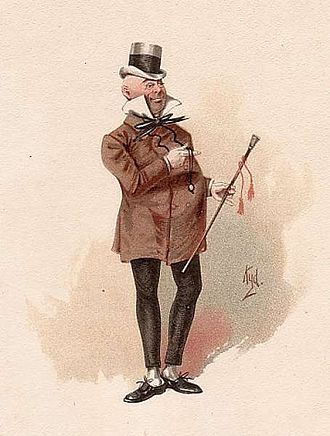
Very like, although I always think of W.C. Fields from the 1935 film version :D
 I love this character! I think Charles Dickens must have been quite pleased with him too, as it's the closest parallel with his father anywhere in his writing that I know of, but there are several little portraits of his mother - Mrs Nickleby was one, and now Mrs Micawber. It's as if he never felt he'd quite got it right!
I love this character! I think Charles Dickens must have been quite pleased with him too, as it's the closest parallel with his father anywhere in his writing that I know of, but there are several little portraits of his mother - Mrs Nickleby was one, and now Mrs Micawber. It's as if he never felt he'd quite got it right! That's a great picture by Kyd (J. Clayton Clarke)! Usually most of his I find very off the mark, but not that one. Here's another of Mr Micawber that he painted at another time:
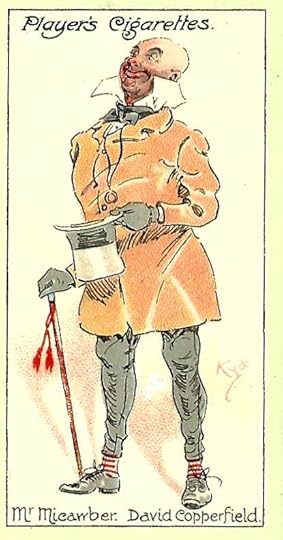
And here's the back of that cigarette card:
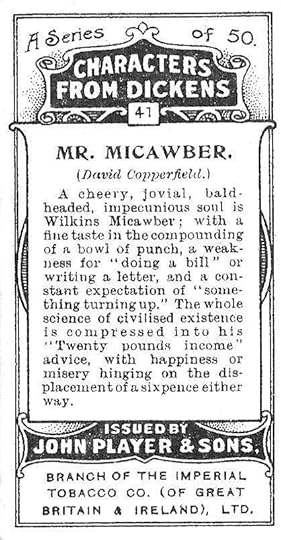
 Here are a couple by Fred Barnard which I like,
Here are a couple by Fred Barnard which I like,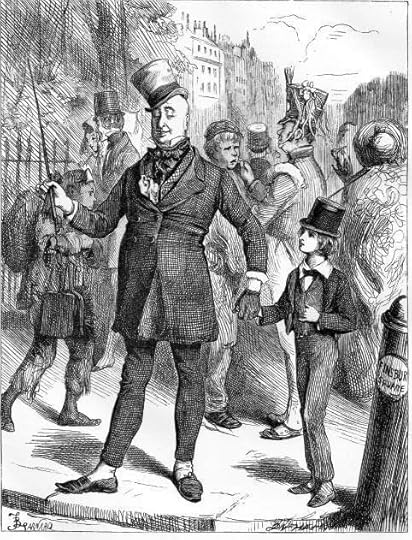
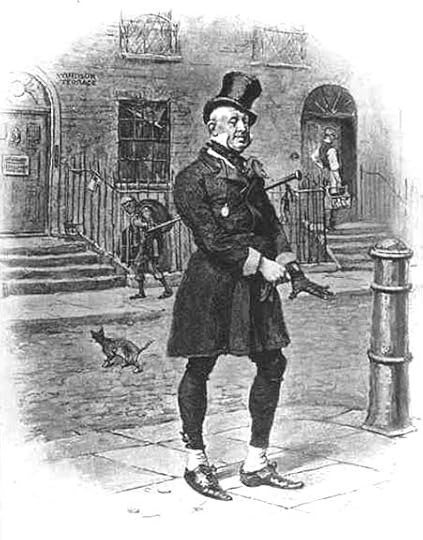
I think the second one of Barnard's is the closest to how I actually see Mr Micawber! Although for preference overall I don't think you can beat Phiz's caricatures :)
 And this is another which doesn't really grab me. The artist is Sol Eytinge, from an edition published in Boston in 1867:
And this is another which doesn't really grab me. The artist is Sol Eytinge, from an edition published in Boston in 1867: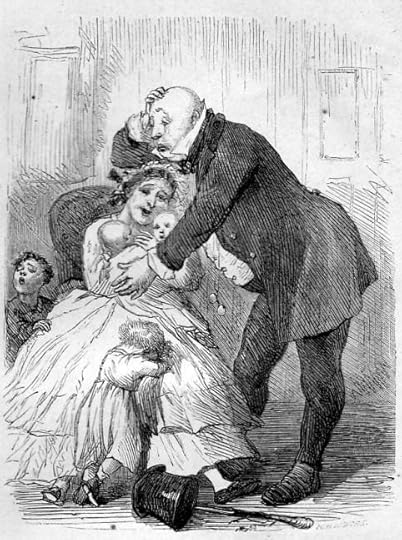
 Great synopsis of his character - when I was smoking cigarettes never had such interesting packaging!
Great synopsis of his character - when I was smoking cigarettes never had such interesting packaging! I like how Dickens lightens the gloom of David's situation (view spoiler) by the introduction of Mr. & Mrs. Micawber. That continual contrasting or mixing of good and bad, light and dark, is one of this book's strengths I think.
 I agree! It's one of the reasons I love his writing as he pushes the darkness just so far, until you feel you can't stand any more, and then provides welcome light relief. Makes you laugh, makes you cry :)
I agree! It's one of the reasons I love his writing as he pushes the darkness just so far, until you feel you can't stand any more, and then provides welcome light relief. Makes you laugh, makes you cry :)
 Wilkins Micawber is perhaps the most well-known parallel to a real person in Dickens's life. He's a direct portrait of Dickens's own father - an improvident gentleman - and his history in David Copperfield also mimics real life. What isn't mentioned quite so often is that his wife is also heavily based on his real-life mother. In fact we first saw a representation of Dickens's mother in Nicholas Nickleby, where again she was caricatured as the protagonist's mother. She come up in later novels too. Dickens clearly feels he has to exorcise these memories somehow, without betraying his family - they come up so often!
Wilkins Micawber is perhaps the most well-known parallel to a real person in Dickens's life. He's a direct portrait of Dickens's own father - an improvident gentleman - and his history in David Copperfield also mimics real life. What isn't mentioned quite so often is that his wife is also heavily based on his real-life mother. In fact we first saw a representation of Dickens's mother in Nicholas Nickleby, where again she was caricatured as the protagonist's mother. She come up in later novels too. Dickens clearly feels he has to exorcise these memories somehow, without betraying his family - they come up so often! And then there's his own consciousness of being socially superior to his working class fellows and also more intelligent. He feels humilated by being with them. We got that before with little Oliver Twist, never picking up the way of the Artful Dodger and his gang. Now we have a rereun, as David will not fraternise with Walker and Mealy Potatoes and is referred to as "the little gent" by some of the workers at the warehouse.
 Of all the illustrations I've seen so far, I still prefer the originals by "Phiz" the best :) But here's quite a creditable one of Mr. Murdstone, from the 1920's, by Frank Reynolds:
Of all the illustrations I've seen so far, I still prefer the originals by "Phiz" the best :) But here's quite a creditable one of Mr. Murdstone, from the 1920's, by Frank Reynolds: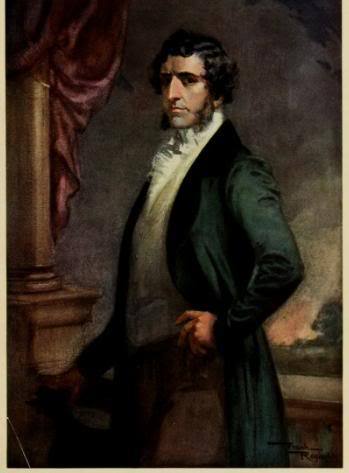
I think that this portrait conveys his "firm" dispostion very well, but also you can see how a vain silly little flibbertigibbet like Clara would have fallen in love with his noble looks and bearing.
 Mr. Creakle seems to be a direct parallel to the sadistic master William Jones, whom Dickens had as a child. Here's a bit about Mr. Creakle,
Mr. Creakle seems to be a direct parallel to the sadistic master William Jones, whom Dickens had as a child. Here's a bit about Mr. Creakle,"Here I sit at the desk again, watching his eye — humbly watching his eye, as he rules a ciphering-book for another victim whose hands have just been flattened by that identical ruler, and who is trying to wipe the sting out with a pocket-handkerchief. I have plenty to do. I don't watch his eye in idleness, but because I am morbidly attracted to it, in a dread desire to know what he will do next, and whether it will be my turn to suffer, or somebody else's. A lane of small boys beyond me, with the same interest in his eye, watch it too. I think he knows it, though he pretends he don't. He makes dreadful mouths as he rules the ciphering-book; and now he throws his eye sideways down our lane, and we all droop over our books and tremble. A moment afterwards we are again eyeing him. An unhappy culprit, found guilty of imperfect exercise, approaches at his command. The culprit falters excuses, and professes a determination to do better tomorrow. Mr. Creakle cuts a joke before he beats him, and we laugh at it, — miserable little dogs, we laugh, with our visages as white as ashes, and our hearts sinking into our boots."
How like children. So scared by the brutish bully Creakle, that not only are they cowed by him but join in the "joke", whilst knowing full well it is wrong. He instills both fear and cowardice in one fell swoop.
This reminded me of a bit in one of his essays in "Household Words", ("Our School", October 1851) where he noted that "the Chief" (William Jones) had a penchant for ruling ciphering-books, and then,
"smiting the palms of offenders with the same diabolical instrument".
Obviously this was an image which stuck. The description of Creakle beating the boys is indeed diabolical :(
 Chapter 11 is the most autobiographical so far. It's so obvious that David's (view spoiler) is a direct parallel to Charles Dickens's own experience in Warren's Blacking Factory. There are many passages very similar to his own account of that time. Here's an extract from John Forster's biography of Charles Dickens's early years from 1812 to 1842,
Chapter 11 is the most autobiographical so far. It's so obvious that David's (view spoiler) is a direct parallel to Charles Dickens's own experience in Warren's Blacking Factory. There are many passages very similar to his own account of that time. Here's an extract from John Forster's biography of Charles Dickens's early years from 1812 to 1842,"It is wonderful to me how I could have been so easily cast away at such an age. It is wonderful to me that, even after my descent into the poor little drudge I had been since we came to London, no one had compassion enough on me — a child of singular abilities, quick, eager, delicate, and soon hurt, bodily or mentally — to suggest that something might have been spared, as certainly it might have been, to place me at any common school. Our friends, I take it, were tired out. No one made any sign. My father and mother were quite satisfied. They could hardly have been more so if I had been twenty years of age, distinguished at a grammar-school, and going to Cambridge."
Bitter and heartfelt. Now compare a section at the beginning of chapter 11 in David Copperfield,
it is matter of some surprise to me, even now, that I can have been so easily thrown away at such an age. A child of excellent abilities, and with strong powers of observation, quick, eager, delicate, and soon hurt bodily or mentally, it seems wonderful to me that nobody should have made any sign in my behalf. But none was made; and I became, at ten years old, a little labouring hind in the service of Murdstone and Grinby."
It's almost a vicarious confession - or admission - of how he could not understand his own parents' reasoning here. Some parts are duplicated word for word! The descriptions of the two warehouses are similarly described, with some parts also being identical.
 Does this sound at all familiar?
Does this sound at all familiar?(view spoiler)
No, not from chapter 11 of David Copperfield - though it might as well be! It's actually from John Forster's account of his life, from Charles Dickens's own experience again!
Little wonder then, that Dickens called this book his "favourite child"!
Murdstone and Grinby is another example of the clever puns or tricky word associations Dickens loves to include. "Grinby" makes us think of a "grindstone", with the stone part from "Murdstone". Here we are being told that David is "having his nose put to the grindstone".
 Jean wrote: "Of all the illustrations I've seen so far, I still prefer the originals by "Phiz" the best :) But here's quite a creditable one of Mr. Murdstone, from the 1920's, by Frank Reynolds: ..."
Jean wrote: "Of all the illustrations I've seen so far, I still prefer the originals by "Phiz" the best :) But here's quite a creditable one of Mr. Murdstone, from the 1920's, by Frank Reynolds: ..."Oh my, he is quite handsome there! I noticed this time around that I got more of a feeling that Murdstone might actually be in love with Clara. In the past, I suspected he was after her small annuity (since it is mentioned that he had been "in difficulties").
Jean wrote: "Wilkins Micawber is perhaps the most well-known parallel to a real person in Dickens's life. He's a direct portrait of Dickens's own father - an improvident gentleman - and his history in ..."
Is there a real life original of Clara, David's mother? She is so similar to Dora, don't you think?
 I am up to Chapter 16 now. I love Mr. Dick & his preoccupation with King Charles I's head. And Miss Trotwood's aversion to donkeys always makes me laugh! :-)
I am up to Chapter 16 now. I love Mr. Dick & his preoccupation with King Charles I's head. And Miss Trotwood's aversion to donkeys always makes me laugh! :-)
 As I suspected, you are now going to leap ahead of me Leslie! LOL! Still thinking of all the allusions up to exactly that point :) Will post in a couple of days' time.
As I suspected, you are now going to leap ahead of me Leslie! LOL! Still thinking of all the allusions up to exactly that point :) Will post in a couple of days' time.
 Mr. Dick:
Mr. Dick:
I'm now up to ch 16, and we've met some more of my favourite characters. I had been looking forward to meeting Mr. Dick again, as the last time I read this book I hadn't realised he was based on a real person. Aunt Betsey Trotwood says,
"'I suppose ... you think Mr. Dick a short name, eh? ...
You are not to suppose that he hasn't got a longer name, if he chose to use it ... Babley — Mr. Richard Babley — that's the gentleman's true name ... But don't you call him by it, whatever you do. He can't bear his name. That's a peculiarity of his. Though I don't know that it's much of a peculiarity, either; for he has been ill-used enough, by some that bear it, to have a mortal antipathy for it, Heaven knows.'"
'He has been CALLED mad ... I have a selfish pleasure in saying he has been called mad, or I should not have had the benefit of his society and advice for these last ten years and upwards'"
"Richard Babley" is based on the Victorian artist Richard Dadd, most famous for his incredibly detailed painting "The Fairy Feller’s Master-Stroke", which he painted in Bethlem Hospital (the original for the word "bedlam"). He had had what appears to be a psychotic illness, had murdered his father and was attempting to kill another man on a train, when he was apprehended and taken to the insane asylum.
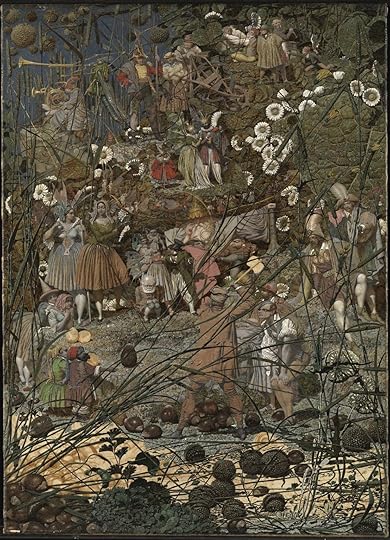
The Fairy Feller’s Master-Stroke
It's in the Tate Gallery, in London. It is quite small, approx. 54 x 40cm, but incredibly precise and detailed. Surprisingly often, you find that reproductions of Richard Dadd's paintings are in fact details from this one.
I recently read an interesting bio of Richard Dadd Richard Dadd: The Artist and the Asylum by Nicholas Tromans, and that's where I discovered he was the original for "Mr. Dick". He was a very fashionable artist during Dickens's lifetime. Another interesting fact is that Richard Dadd was born in Chatham, Kent in 1817, the year before the Dickens family arrived there.
Here's my review of Richard Dadd's biography.
 Charles I
Charles IAnother fact to bear in mind, when thinking of Mr. Dick's obsession with the idea that the facts in Charles the First's head had somehow got into his own, is the timing of the original serialisation of David Copperfield. It had started in May 1849, and by the time of the 4th issue - exactly when we meet Mr. Dick - it was August 1849.
This was the Bicentenary of the execution of Charles I. No doubt most people reading the story would be aware of the importance to history of this beheaded monarch.
 Jean wrote: "Charles I
Jean wrote: "Charles IAnother fact to bear in mind, when thinking of Mr. Dick's obsession with the idea that the facts in Charles the First's head had somehow got into his own, is the timing of the original s..."
Ah, the bicentennial adds to the prominence of all the Charles I allusions.
Interesting info about Mr. Dick's original, Richard Dadd! You always have such a wealth of information about the novels, characters and settings Jean :)
I finished Chapter 21 & then decided not to rush ahead. I am going to try going more leisurely this time and savour the experience.
 Thank you Leslie! You'll never guess who's up next ... well maybe you will, but the real-life person he's based on is truly astounding!
Thank you Leslie! You'll never guess who's up next ... well maybe you will, but the real-life person he's based on is truly astounding!
 So here he is. He of the clammy hands - one of Dickens's most deliciously awful grotesques :) ...
So here he is. He of the clammy hands - one of Dickens's most deliciously awful grotesques :) ...Uriah Heep:
And here is our first encounter with him,
"The low arched door then opened, and the face came out. It was quite as cadaverous as it had looked in the window, though in the grain of it there was that tinge of red which is sometimes to be observed in the skins of red-haired people. It belonged to a red-haired person — a youth of fifteen, as I take it now, but looking much older — whose hair was cropped as close as the closest stubble; who had hardly any eyebrows, and no eyelashes, and eyes of a red-brown, so unsheltered and unshaded, that I remember wondering how he went to sleep. He was high-shouldered and bony; dressed in decent black, with a white wisp of a neckcloth; buttoned up to the throat; and had a long, lank, skeleton hand, which particularly attracted my attention, as he stood at the pony's head, rubbing his chin with it, and looking up at us in the chaise."
Here's an illustration by Fred Barnard of Uriah Heep,

Now what's surprising is not so much that he's based on a real person - we're used to that with Dickens by now - but just exactly who it is. His physical appearance and mannerisms are based on ... Hans Christian Andersen!
I think I may have mentioned before that there was no love lost between these two. Originally they were the best of friends, but Hans Christian Andersen did not have a proper home of his own, and scrounged visits to his friends, always overstaying his welcome. When he finally left, Dickens scrawled on the mirror that he had stayed for 5 long weeks,
"which seemed to the family simply ages!"
and one of Dickens's daughters, who had originally thoroughly enjoyed Hans Christian Andersen's storytelling sessions agreed, eventually referring to him as, "the bony bore". Here he is,

and there's another great photo of the eccentric author on his Goodreads author page.
It does seem a little unkind of Charles Dickens, this particular portrayal, however mingy his erstwhile friend had been!
 Last week I started David Copperfield (I'm now on chapter 25). I always viewed Dickens as an author of satire and humor, which is just as true here as in any other of his books. The absurdities in his characters are delightful: Betsey Trotwood and donkeys, Mr. Barkis and his "box of clothes," Mr. Dick and Charles I, etc.
Last week I started David Copperfield (I'm now on chapter 25). I always viewed Dickens as an author of satire and humor, which is just as true here as in any other of his books. The absurdities in his characters are delightful: Betsey Trotwood and donkeys, Mr. Barkis and his "box of clothes," Mr. Dick and Charles I, etc. However, besides the humor, I unexpectedly found in Dickens's writing an element that is poignant. To elicit any emotional response in me is a skill that only Hugo has achieved; that is, until now. David's abuse as a child was heart-rending, and later I had to calm myself down with "it's just a book" after a heated internal rant against the Murdstones. And then I laughed aloud (also rare) at Miss Mowcher and Betsey Trotwood.
In short (as Mr. Micawber would say), I absolutely love Dickens.
 Hi Benjamin,
Hi Benjamin,Yes, it's a delight. I'm so glad you love it too! I always go to Dickens for his humour - and he too can also make me inadvertently laugh out loud. Four of the five characters you have named actually have their basis in real life, which I find quite startling. I'll post about the others in due course but here's a bit more about Uriah Heep (or should I say Hans Christian Andersen:
This illustration by Phiz shows when (extremely coincidentally and fortuitously to the plot), in chapter 17 (view spoiler)
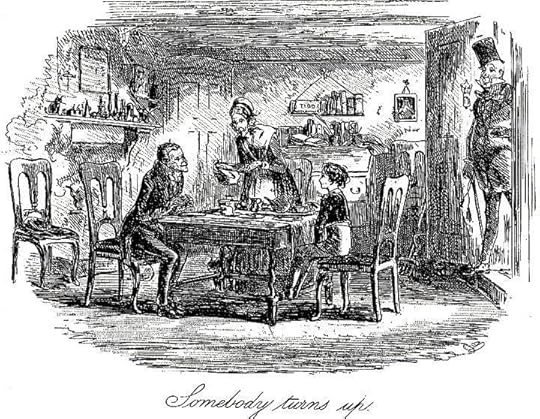
It's really packed with detail! We've learnt about the Heeps' "corkscrewing" out of facts about David, and there is a corkscrew hanging on the wall.
There are other metaphors too, such as a stuffed owl (representing the predatory watchfulness of the Heeps) the mousetrap and cats. There are both ceramic cats, and a real cat next to Mrs. Heep.
And why is the doorknocker pulling such a face? Who is actually annoyed? Or is it because David is annoyed at these characters meeting up?
 For once, I actually like this illustration by Kyd, (J. Clayton Clarke)
For once, I actually like this illustration by Kyd, (J. Clayton Clarke)
"I am well aware that I am the 'umblest person going, let the other be where he may. My mother is likewise a very 'umble person. We live in a numble abode, Master Copperfield, but have much to be thankful for."
 OK so we know that Uriah Heep's physical appearance body language:
OK so we know that Uriah Heep's physical appearance body language:"He had a way of writhing when he wanted to express enthusiasm, which was very ugly; and which diverted my attention ... to the snaky twistings of his throat and body"
and general parsimony and meanness was based on Charles Dickens's rather jaded view of Hans Christian Andersen.
But other critics have commented that Uriah Heep's character is based on Blifil from The Adventures of Tom Jones. Apparently he was the antagonist of the story, whose vile nature was camouflaged by "sugary hypocrisy"
Also, there might be a biblical connection to Uriah. In the Bible, Uriah the Hittite was the husband of Bathsheba. The Biblical David was enamoured of Bathsheba, and in David Copperfield we have two male characters, both of whom admire Agnes Wickford.
 Still to come from your list of favourites Benjamin - the originals of Betsey Trotwood and Miss Mowcher!
Still to come from your list of favourites Benjamin - the originals of Betsey Trotwood and Miss Mowcher!How far have you read now, Leslie?
I am a third through. I don't ever want to finish this book though :)
 I haven't read any since I last posted but will probably listen to a few chapters today. Glad to have you join us Benjamin!
I haven't read any since I last posted but will probably listen to a few chapters today. Glad to have you join us Benjamin!Love the Uriah illustrations! I am a tad taken aback by his being based on Andersen though. I had forgotten he was a red-head and while I was listening to the description in Chap. 15 (the one you quoted in post 987 - I had highlighted that section too!), I suddenly thought that Damian Lewis would be a good actor to play the adult Uriah Heep. Particularly with this haircut:

He has those typical invisible eyelashes that red-heads have and I have always thought of him as slimy ever since I saw him play Soames Forsyte (unfair to the actor, I know, but I can't help it!).
 Good casting Leslie! Uriah's "shadowless red eyes, which looked like they had scorched their lids off" sort of snake-like or reptilian.
Good casting Leslie! Uriah's "shadowless red eyes, which looked like they had scorched their lids off" sort of snake-like or reptilian.Poor Damian - quite well-named for the part himself, his name suggesting an evil, devil-like character, just like Uriah, writhing about as if he had a "splay foot on Mr. Wickfield's head" and a "snakey undulation pervading his frame".
I think the best Uriah Heep I saw was by Nicholas Lyndhurst, who had the grovelling writhing manner perfectly.
Yes, attacking Hans Christian Andersen with such a vile portrait was rather vicious of Mr. Dickens, I feel. More in line with William Makepeace Thackeray's waspishness really.
Yes leslie!!! Great idea.
And I didn't know as well of this direct - vicious as Jean said - to Andersen. But jealousy has always been a strong point with writers!
And I didn't know as well of this direct - vicious as Jean said - to Andersen. But jealousy has always been a strong point with writers!
 True. And in David Copperfield, perhaps because parts are heavily autobiogaphical, I'm find more of his characters are based on actual people than in any other novel of his. Sometimes he switches names about as well.
True. And in David Copperfield, perhaps because parts are heavily autobiogaphical, I'm find more of his characters are based on actual people than in any other novel of his. Sometimes he switches names about as well.I do like the way Charles Dickens selects his names according to whether the characters are to be admired or despised! So we had the odious headmaster Mr. Creakle and now we have an admirable teacher Dr. Strong. You couldn't get a more positive name! He apparently is based on a teacher whom Charles Dickens had when he was very young. But, interestingly, the name "Strong" is actually taken from his own experience too ... Here's another of his "real life" characters. Would you believe he pinched the donkey episode?
 Aunt Betsey Trotwood:
Aunt Betsey Trotwood:
Miss Betsey Trotwood is based on a Miss Mary Pearson Strong, who used to reside at 12, High Street, Broadstairs, Kent. This is now the location of The Dickens House Museum.
When Charles Dickens went to stay in Broadstairs for the first time in 1837 he was twenty-five years old and already famous (as the author of The Pickwick Papers). Taking lodgings with Miss Pearson Strong he carried on working on the book, and was to return to the town often. It was in Broadstairs where he found much of the inspiration for Aunt Betsey Trotwood.
Dickens's own son, Charles, wrote that Miss Strong was a kindly and charming old lady who used to feed him tea and cakes! It was Miss Pearson Strong who was,
"firmly convinced of her right to stop the passage of donkeys in the front of her cottage. Miss Strong would chase the seaside donkey-boys from the piece of garden in front of her cottage".
Although Charles Dickens was to faithfully recall the donkey incident in his character of Betsey Trotwood, Dickens moved the location to Dover. Charles Dickens's son surmised that this was done to avoid any embarrassment to Miss Strong.
Charles Dickens's description of Aunt Betsey's cottage is through the eyes of the young David Copperfield. There is a square gravelled garden full of flowers, and a parlour with old-fashioned furniture. The garden is still there, and still belongs to the house, although now it is across a busy road from "The Dickens House Museum" in Broadstairs.
It's somewhere I would very much like to visit some day!
Jean wrote: "
Aunt Betsey Trotwood:
Miss Betsey Trotwood is based on a Miss Mary Pearson Strong, who used to reside at 12, High Street, Broadstairs, Kent. This is now the location of The Dickens House Museu..."
That I've seen this summer!!! The two are my two kids!
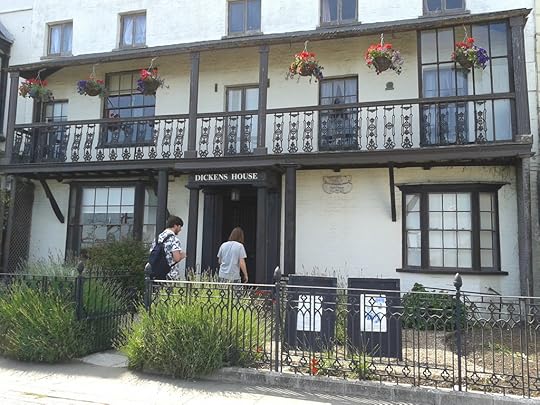
Aunt Betsey Trotwood:
Miss Betsey Trotwood is based on a Miss Mary Pearson Strong, who used to reside at 12, High Street, Broadstairs, Kent. This is now the location of The Dickens House Museu..."
That I've seen this summer!!! The two are my two kids!

 There you go! Did you see the ghost of Aunt Betsey, Laura? Or the donkeys? LOL! (Next time I'm coming with you!)
There you go! Did you see the ghost of Aunt Betsey, Laura? Or the donkeys? LOL! (Next time I'm coming with you!)
I sort of "heard" the donkeys passing!!!
And next time, if you're not coming with me, I'll come and pick you up!!!
And next time, if you're not coming with me, I'll come and pick you up!!!
 I have gotten to the part where David is living in lodgings in London & starting in the law. I will pause here for a while.
I have gotten to the part where David is living in lodgings in London & starting in the law. I will pause here for a while.I love the idea that Miss Betsey's aversion to donkeys is based on a real person :) Does anyone know why Miss Pearson Strong disliked them so?
I am looking forward to hearing about Miss Mowcher, Jean. Such a very strange character!
 Nope. I do not like Mrs Markleham (Annie Strong's mother, and consequently mother-in-law to Dr. Strong) and her silly hat,
Nope. I do not like Mrs Markleham (Annie Strong's mother, and consequently mother-in-law to Dr. Strong) and her silly hat, "Her name was Mrs. Markleham; but our boys used to call her the Old Soldier, on account of her generalship, and the skill with which she marshalled great forces of relations against the Doctor. She was a little, sharp-eyed woman, who used to wear, when she was dressed, one unchangeable cap, ornamented with some artificial flowers, and two artificial butterflies supposed to be hovering above the flowers ... it always made its appearance of an evening ... the butterflies had the gift of trembling constantly; and ... improved the shining hours at Doctor Strong’s expense, like busy bees."
Apart from all the suspicions we are being encouraged to harbour about her motives, she's such an opinionated old biddy, of the type Dickens writes so well.
How many objectionable people have you known to whom this could be attributed, whether overtly or merely indicated by their behaviour?
“I must really beg that you will not interfere with me, unless it is to confirm what I say.”
LOL! What a gem! :D
Books mentioned in this topic
David Copperfield (other topics)The Cricket on the Hearth (other topics)
Pinocchio (other topics)
The Cricket on the Hearth (other topics)
The Cricket on the Hearth (other topics)
More...
Authors mentioned in this topic
John Sutherland (other topics)John Forster (other topics)
John Sutherland (other topics)
Charles Dickens (other topics)
Fyodor Dostoevsky (other topics)
More...




